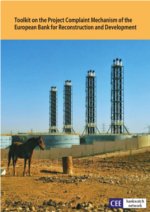Toolkit on the Project Complaint Mechanism of the European Bank for Reconstruction and Development
The Project Compliance Mechanism (PCM) is the EBRD's accountability mechanism for the assessment and follow-up of complaints about project financed by the bank. The PCM is a grievance mechanism for civil society, local groups and individuals that may be directly and adversely affected by a bank project. It's purpose is to help identify when the EBRD or its client has not fulfilled the obligations defined in the bank's policies and to facilitate a problem-solving process with the EBRD's client.







